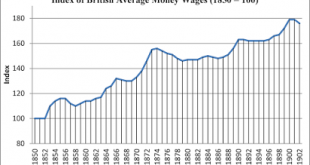That is, what is the case against the actual theory presented by Karl Marx in volume 1 of Capital? This was the only volume of Capital that Marx published in his lifetime, and volume 3 contradicts volume 1 in important respects.First, we need to know what Marx actually argued in volume 1 of Capital.The essence of Marx’s theory and his conception of the historical tendency of capitalism is as follows:(1) Marx had an elaborate labour theory of value on which he founded volume 1 of Capital (see...
Read More »Lenin on Open Borders
Here is Lenin speaking about mass immigration in 1913:“Capitalism has given rise to a special form of migration of nations. The rapidly developing industrial countries, introducing machinery on a large scale and ousting the backward countries from the world market, raise wages at home above the average rate and thus attract workers from the backward countries.Hundreds of thousands of workers thus wander hundreds and thousands of versts. Advanced capitalism drags them forcibly into its orbit,...
Read More »Robert Paul Wolff on Marx
[embedded content] Robert Paul Wolff always worth. Should read his Understanding Marx. He surprisingly says that Analytical Marxism has taken over Marxism. To get to Marxism he had to learn economics, the classical political economy of the Ricardian kind, and learn linear algebra. Hegelianism was not really central to the message (in my view, but he does say he hates Hegel). Labor Theory of Value explained, but he does not discuss Piero Sraffa's contributions directly here. There is no way...
Read More »A Terse Elucidation of Marx’s Concern with Alienation in the Mature Writings
By David FieldsNote: The references below are drawn from The Marx-Engels Reader, edited by Robert C. Tucker.Is Marx’s concern with aspects of alienation subsumed in his mature writings? To suggest so is a falsity. Marx’s depiction of the proletariat becoming, in the Hegelian sense, emancipated from the objective conditions of estranged labour, is not withered as the analysis moves toward the technical conditions of production. Marx’s humanism is still apparent.In Wages, Labour, and...
Read More »Response to Jehu on “Four Questions for LK on Money”
A Marxist called “Jehu” who writes at The Real Movement blog challenges me here with four questions: Jehu, “Four Questions for LK on Money,” The Real Movement, February 20, 2016. His four questions are as follows: (1) Did not Marx predict the collapse of production on the basis of exchange value?(2) Did this collapse occur in the 1930s just as Marx predicted it would?(3) To save capitalism was it not necessary to sever gold from fiat?(4) What was the implication of the collapse of the gold...
Read More »Would Capitalism necessarily be destroyed if Human Labour fell towards Zero?
In a word: no.Why? Because an economy with more and more automation based on private enterprise and private capitalist production could still sell its output and obtain money profits, if a government managed the demand-side of the economy by providing a guaranteed income (with, say, taxes on consumption, property, and ownership of financial and real assets and returns from those assets, with the shortfall covered by central bank money creation). As long as the balance of payments functioned...
Read More »Marx’s Capital, Volume 1, Chapter 12: A Critical Summary
Chapter 12 of volume 1 of Capital is called “The Concept of Relative Surplus Value” and it deals with yet further aspects of surplus value.Marx points to another way of increasing surplus value. He considers this representation of the working day: Working Day 1: A-----------B--CWorking Day 2: A-----B′---B--C AB represents the necessary labour-time equivalent to the value of maintaining and reproducing workers. BC therefore represents surplus labour.In Working Day 2, the total length of the...
Read More »Louis Boudin on the Contradiction between Volumes 1 and 3 of Marx’s Capital
From Louis Boudin’s book The Theoretical System of Karl Marx in the Light of Recent Criticism (1920): “The appearance in 1894 of the third volume of Capital created a sensation in interested circles. While it does not stand in any direct relation to the Revisionist movement, it can hardly be denied that it made its formal argumentation more plausible. The solution of the Great Contradiction contained in the third volume, and the rest of the matter therein contained and intimately connected...
Read More »Marx’s Capital, Volume 1, Chapter 10: A Critical Summary
Chapter 10 of volume 1 of Capital is called “The Working Day” (Marx 1990: 340), and it deals with aspects of the working day in capitalism.Marx divides the chapter into seven sections: (1) The Limits of the Working Day;(2) The Voracious Appetite for Surplus Labour;(3) Branches of English Industry without Legal Limits to Exploitation(4) Day-Work and Night-Work. The Shift System(5) The Struggle for a Normal Working Day(6) The Struggle for a Normal Working Day. Laws for the Compulsory...
Read More »Rudolf Hilferding on the Law of Value in Volume 1 of Capital
In 1904, Rudolf Hilferding wrote a response to Böhm-Bawerk (1896) called “Böhm-Bawerk’s Criticism of Marx” (Hilferding 1949 [1904]).In this essay of Hilferding, we have a fascinating confirmation of the way in which the early Marxists were concerned to still vindicate the law of value in volume 1 of Capital – the idea that commodities tend to exchange at pure labour values – as an empirical theory.Like Engels, they seized on Marx’s statement in Chapter 10 of volume 3 of Capital as follows:...
Read More » Heterodox
Heterodox


